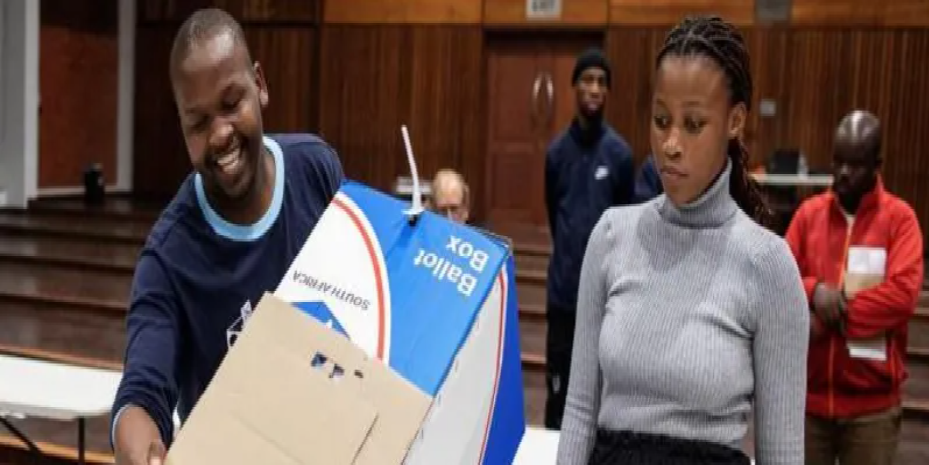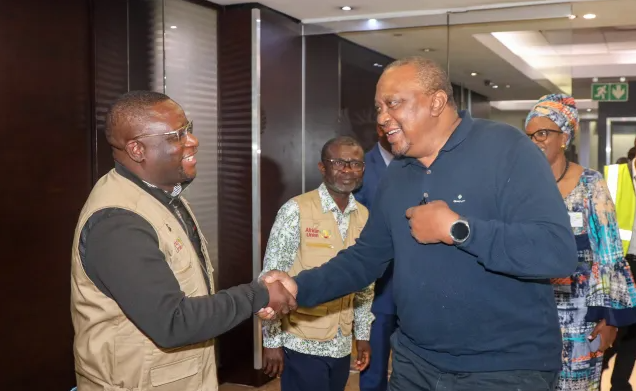The initial outcomes from what’s seen as South Africa’s most fiercely debated elections since the African National Congress (ANC) assumed power three decades back are out. This marks an important time in the country’s democratic past. So far, counting of the votes has been wrapped up in almost 27% of the total voting stations. With the counting so far done, ANC is at the front with 43%, next in line is Democratic Alliance (DA) which has 25%. The Economic Freedom Fighters (EFF) which is famous for their hardline approach is at 9%, compared to the uMkhonto weSizwe Party (MK Party), headed by former President Jacob Zuma, which is at approximately 8%. The South African election process is spearheaded by Uhuru Kenyatta, the former president of Kenya. The complete results of the election will be disclosed over the weekend. ANC has maintained the majority number in parliament since 1994 when the apartheid system was terminated in South Africa. However, these first results predict that they may lose that position for the first time in history. Just like any other African country, South Africa is facing a lot of challenges like crime, unemployment, and increasing corruption levels. A lot of citizens point fingers at the ANC for causing these issues. A young girl playing with her teddy bear while people are voting In the 2019 elections, ANC experienced a win of 57%. However, this year it is likely to experience a decrease to 42% which is a huge loss to the party. This information was predicted by the News24 website and the respected Council for Scientific and Industrial Research (CSIR) The decrease is likely to push ANC into forming collaborations with one or more other parties to reach the majority needed in parliament. Before forming the collaborations, ANC will have to bear in mind that Democratic Alliance has market oriented policies, while the two other parties prefer nationalisation and more state intervention. Choosing a partner is expected to bring a huge difference to the route South Africa is taking. Democracy Works Foundation, a non-profit organization, through their leader Prof William Gumede, stated that it’s uncertain whether President Cyril Ramaphosa will stay in his role. Prof William also added that President Ramaphosa could get a lot of pressure from the ANC to resign. The pressure can be caused by the party attaining less than 45% in the end results. He explained that the deputy, Paul Mashatile, might be in line to take over from the president. A citizen arguing with the polling station officer In South Africa, unlike in many other African countries, voters do not directly elect the president; instead, they vote for members of parliament who later elect the president. In KwaZulu-Natal, Mr. Zuma’s party possesses 43% of the votes, while the ANC has 21%. These results from this area indicate a few of the difficulties that ANC is experiencing from MK. Mr. Zuma surprised many in December when he revealed that he was leaving the ANC to campaign for MK. KwaZulu-Natal, the province with the second-highest number of registered voters and Mr. Zuma’s home will be important in determining whether the ANC can maintain its majority control in the parliament. Despite being prohibited from running for parliament due to a disrespect of a court order, Mr. Zuma’s name emerged on the ballot paper as the leader of MK. In Gauteng, South Africa’s business capital, the ANC holds 36% of the vote, while the DA has 29%. This is another region where the ANC is projected to fall behind. The South African elections, conducted on Wednesday, drew crowds of citizens, and the voting process went into the wee hours. People queuing to vote Reports from the electoral board indicate that the last polling station was on until 0300 on Thursday morning local time. The last time South Africa had such long queues during an election was in 1994, when black people were granted the freedom to vote for the first time. In the election, a total of 11 independents and 70 parties ran for office as the country chose nine provincial legislatures and a new parliament. The DA had earlier agreed to cooperate with 10 parties to form a government if they gathered enough votes. This coalition could potentially kick the ANC from their long-held position of power since 1994.
Election Preparations: Uhuru Kenyatta in South Africa
Uhuru Kenyatta, the former president of Kenya, is currently in South Africa to oversee the country’s upcoming general elections on May 29, 2024. In a statement released on Sunday, May 26 2024, Uhuru noted that he was greeted in Johannesburg by officials from the African Union (AU) and High Commissioner Jane Ndurumo. Uhuru arrived in Johannesburg on Saturday evening, ahead of the elections which are scheduled to take place on Wednesday, May 29, 2024. Kenyatta, who was nominated by the African Union Commission (AUC) will guide the African Union Election Observation Mission (AUEOM) in overseeing the elections. Moussa Faki Mahamat, the Chairperson of the African Union Commission, has agreed to send a short-term AUEOM to South Africa to assess and document the conduct of this election, following invitations extended by the South African government and the Independent Electoral Commission (IEC) of South Africa. The AU stated that the mission will interact with state authorities, the Independent Electoral Commission, political parties, the media, civil society organizations, and international representatives during the upcoming 2024 elections. Made up of 60 short-term observers (STOs), the AUEOM consists of officials from election management bodies, ambassadors recognized by the African Union, and individuals from African civil society organizations. It also consists of specialists in human rights, gender matters, African election experts, and media affairs, alongside representatives from youth groups. people queuing to vote Observers come from 24 nations which include Angola, Benin, Botswana, Burundi, Cameroon, Congo (Kinshasa), Egypt, Ethiopia, Eswatini, Gambia, Ghana, Kenya, Lesotho, Mauritius, Morocco, Mozambique, Namibia, Nigeria, South Sudan, Togo, Tunisia, Uganda, Zambia, and Zimbabwe. In a statement from the office of the former president, it was mentioned that this appointment represents the continent’s shared efforts to improve the clarity, reliability, and fairness of voting systems across its nations. Election monitoring is very important in protecting voting system integrity by making recommendations and unbiased judgments. The AUEOM will evaluate using the laws guiding elections in South Africa and the OAU/AU Declaration on Democratic Election Principles, the rules from the African Charter on Democracy, Elections and Governance (ACDEG), and the International Declaration of Principles (DoP) for International Election Observation, among other guidelines. The Mission will collaborate with government representatives, the Independent Electoral Commission, political organizations, journalists, grassroots groups, and international delegates. The Mission will also engage with other election monitoring teams sent to oversee the 2024 General Elections in South Africa. The Mission will announce its early findings and advice on the management of the elections on May 31, 2024, in a press event held in Johannesburg, South Africa. Kenyans reacted to Uhuru’s South Africa visit and wondered why every leader was leaving the country. The curiosity of Kenyans comes after President William Ruto and Azimio leader, Raila Odinga, were also on a visit earlier this week. Ruto was on a state visit to the U.S., where he met with President Joe Bidden and First Lady, Jill Biden. Together, they discussed how to strengthen bilateral relations. They focused on security, trade, technology, economic development, and climate change. Ruto was accompanied by Kenyan comedians like Eddie Butita, cabinet secretaries, governors, and the First Lady, Racheal Ruto. Ruto came back to the country on Friday, May 24, 2024. On the other hand, Azimio Leader, Raila Odinga, left for the UK on Thursday, May 24, 2024. Raila was going to give a lecture at the University of Oxford, where he was to tackle the theme of “Forging Africa’s Future: An Expedition of Resilience and Renewal.” Odinga, who was also accompanied by Sifuna, was also set to attend an inauguration ceremony of Lilian Seenoi. Seenoi is a Kenyan politician based in Ireland and was elected as the new mayor of Derry.



